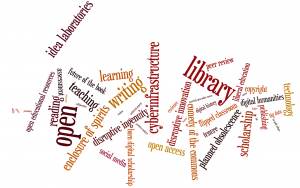
Charles Henry, the President of the Council of Library and Information Resources (aka CLIR) visited Middlebury last week to give a talk about how the future of higher education is being disrupted by a set of major national and international initiatives that collectively bring both promise and challenges to the existing system of teaching, learning, and scholarly communication.
The projects and initiatives he highlighted included the following:
- National Endowment for the Humanities Digging Into Data
http://www.diggingintodata.org/
The projects supported by NEH explore what happens when humanists apply various algorithmic and more importantly collaborative approaches to research in fields that have up to this point been mostly been pursued as solitary scholarly inquiries of an individual mind interacting with a culturally significant work. - Hathi Trust
http://www.hathitrust.org/
This digital library brings forward a significant collection of texts that, once/if copyright issues are resolved, provide scholars and students with access to a treasure trove of materials that (see digging into data above) promote whole new ways of thinking about teaching and inquiry. - Digital Public Library of America
http://dp.la/
This audacious project proposes to take the democratic impulses of our bricks and mortar public libraries and extend them to the internet, providing the general public (and yes, the general public includes the scholarly community) with access to the cultural, artistic, and historical record of our nation and beyond. - Europeana
http://www.europeana.eu/portal/
See above, and apply to the culture, art, and history of Europe. Now imagine these two projects merged.
- Digital Preservation Network
http://digitalpreservationnetwork.wordpress.com/
A completely digital system requires checks and balances to assure that our archives and our systems of record are reliable, robust, and durable over the long-haul, with the long-haul being measured not in years but in centuries. - Linked Open Data
http://linkeddata.org/
New ways to publish data using open meta-data standards allow for inquiry and discovery that may make blush the blunt instruments of google and its brethren.
- Semantic Web
http://semanticweb.org/wiki/Main_Page
Connected to projects to promote linked open data, the semantic web proposes data structures that enable new modes of discovery, analysis, and correlation that rely less on serendipity, and more on the ability of networked computers to communicate with each other independent of human intervention. - Data Curation
http://www.clir.org/initiatives-partnerships/data-curation
As we move increasingly to an all-digital world of scholarly communication, there is a growing need to establish sustainable methods for providing long-term curation of research data. (See digging into data above.) - Anvil
http://www.nitle.org/live/news/195-clir-and-nitle-to-launch-digital-academic
Anvil is a national effort to help the world of academic publishing think through how to support the seemingly inevitable transition from print to screen, from analog to digital, and in so doing, both embracing the real benefits of the digital platform without completely discarding the traditions and benefits of the previous system of scholarly communication.
- Internet 2
http://www.internet2.edu/
Once just a way to provide more bandwidth and higher quality network services, Internet 2 of late has become a very interesting way for the higher ed community to aggregate needs and to negotiate very favorable rates for commercial services.
- Kuali
http://kuali.org/
Kualia is an effort to develep an open-source/community-source alternative to commercial ERP (e.g. Banner, PeopleSoft) that has the potential to provide Higher Education with a way to improve administrative efficiency at greatly reduced cost.
Each of the eleven topics in and of themselves are important and pose important questions for us as we think through our own local technology and library strategies. More provocative, and potentially far more disruptive, is to think (as Chuck encouraged us to do) about how all of these seemingly disconnected trends might connect with one another to enable a whole new ecosystem of teaching, learning, inquiry, and scholarly communication. How might such a system allow us to provide to our faculty and students new services, improved access to resources, new platforms for scholarly communication and collaboration? What role if any might we play in helping to ensure that these transformations do not cause us to abandon that which is essential to our identities? What can we do to help this brave new world be a world that we want to be part of?
It is increasingly clear that the most important work is happening not on individual campuses, but rather as part of consortial projects, or as part of projects spear-headed by entities such as NSF or NEH. The lesson I took away from my time spent talking with Chuck about all of these complex topics is that the future lies in collaboration, innovation, and working at a scale that most schools can not sustain on their own. Unlike other nations with far more influential national systems of education, we live in a country that lacks a tradition of thinking about education (or libraries) at a national level. To a certain degree this consigns visions of a unified and open system to just another idealistic pipe-dream. On the other hand, the entrepreneurial and opportunistic environment that our national non-system of higher education presents may in fact in the end allow for creative and productive disruption to carry the day.